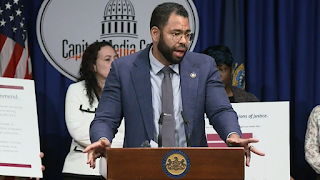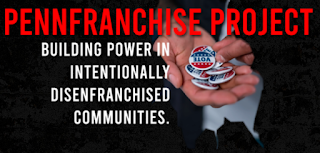In North Carolina, Matilda Bliss and Veronica Coit, two reporters from the progressive Asheville Blade, were convicted of “misdemeanor trespassing after being arrested while covering the clearing of a homeless encampment in a public park in 2021.” The judge in the case “said there was no evidence presented to the court that Bliss and Coit were journalists, and that he saw this as a ‘plain and simple trespassing case’” (VoA, 4/19/23).
They’re appealing the conviction (Carolina Public Press, 5/17/23; NC Newsline, 6/2/23), and they have a good bit of support. In April, Eileen O’Reilly, president of the National Press Club, and Gil Klein, president of the National Press Club Journalism Institute, denounced the reporters’ conviction, saying that they “were engaged in routine newsgathering, reporting on the clearing by local police of a homeless encampment” (PRNewswire, 4/20/23). Available evidence, they said, “shows Bliss and Coit did not endanger anyone or obstruct any police activity,” adding that they “were arrested while reporting on a matter of public importance in their community.”
Dozens of other press advocates, including the Committee to Protect Journalists (5/3/23), PEN America (4/25/23) and the Coalition for Women in Journalism (4/19/23), have blasted the convictions.
‘Anti-establishment views’

The house of two of the Atlanta defendants is “emblazoned with anti-police graffiti in an otherwise gentrified neighborhood” (AP, 5/31/23).
In Atlanta, the assault on protesters against “Cop City”—a planned project that would devastate scores of acres of forest land on the city’s south side for a massive military-style security training complex—amped up when Georgia Bureau of Investigation and Atlanta police “arrested three leaders of the Atlanta Solidarity Fund, which has bailed out [anti-Cop City] protesters and helped them find lawyers” (AP, 5/31/23).
The three were charged with money laundering and charity fraud. The “money laundering” consisted of transferring $48,000 from their group, the Network for Strong Communities, to the California-based Siskiyou Mutual Aid—and back again. The “fraud” amounted to the defendants reimbursing themselves for expenses like building materials, yard signs and gasoline. Deputy Attorney General John Fowler seemed to get closer to the actual reason for the prosecution when he said the defendants “harbor extremist anti-government and anti-establishment views” (Atlanta Journal-Constitution, 6/2/23).
When news broke about the arrests, Atlanta activist and journalist circles were abuzz with fears and questions (Atlanta Community Press Collective, 5/31/23). There must be more to the story, right? These people couldn’t simply be arrested for providing bail and legal support—that would be absurd. What next: arresting defense attorneys?
The judge in the case has shared such skepticism, freeing the three on bond despite pressure from the state attorney general not to, and expressing “concerns about their free speech rights and saying he did not find the prosecution’s case, at least for now, ‘real impressive’” (AP, 6/2/23).
Tensions around Cop City are already high. Its projected cost has doubled (Creative Loafing, 5/29/23), dozens of protesters have been hit with domestic terrorism charges (WAGA, 3/5/23) and an autopsy for an activist killed by police “shows their hands were raised when they were killed” (NPR, 3/11/23).
The recent arrests have only raised the temperature. Not long after the three activists were granted bail, the Atlanta City Council “voted 11–4 after a roughly 15-hour long meeting” to approve the project, “sparking cries of ‘Cop City will never be built!’ from the activists who packed City Hall to oppose the measure” (Axios, 6/6/23; Twitter, 6/6/23).
‘Is she real press?’

Slate (6/1/23): “The state’s intention to criminalize dissent could not have been clearer.”
The Atlanta arrests have received considerable press attention. Slate (6/1/23) and the Intercept (5/31/23) wrote pieces highlighting the severity of the charges. The Asheville case, despite considerable outcry from press advocates, hasn’t had much attention outside left-wing and local press, with the surprising exception of a report on Voice of America (4/19/23), a US government–owned network.
What neither of these cases has received is an outcry from major newspaper editorial boards or network news shows, calling attention to their violation of constitutional rights—although the Atlanta arrests did get a news story in the New York Times (6/2/23) that included condemnations from civil liberties groups. (MSNBC published an op-ed denouncing the arrests on its website—6/3/23.) At FAIR, I have rung the alarm that journalists for both mainstream and small outlets have faced arrests (3/16/21) and extreme police violence (9/3/21). These incidents are part of that trend.
In the Asheville instance, Judge James Calvin Hill was already hostile toward the reporters’ First Amendment claims, as he questioned whether they were actually journalists (Truthout, 6/1/23). “She says she’s press,” a police officer said in court of Coit, to which Hill responded: “Is she real press?”
The Asheville Blade is a small, scruffy left-wing outlet; are we to assume that courts will determine what constitutes a journalistic outlet based on budget, size of distribution, popularity and political orientation?
In the case of the Atlanta arrests, coverage often carried photos of the activists’ Eastside house, painted purple with anti-police signage and graffiti. This hippie vibe might not be the image Atlanta’s powerful business class wants to project as the commercial center of the South; the Atlanta Police Foundation includes support from some of the city’s top corporations (New Yorker, 8/3/23), including Coca-Cola, Delta, Home Depot—and Cox, the Atlanta Journal-Constitution‘s parent company.
The Journal-Constitution, the major local paper, has run pieces (5/8/21, 1/25/23, 3/8/23) in favor of Cop City and other aggressive anti-crime tactics. Its editorial board (8/21/21) declared, “There’s no time to waste in moving to replace the city’s current, dilapidated training grounds,” because “criminals will continue to ply their trade, exacting a cost in property, public fears and even lives.”
Needless to say, this is not the way the Asheville Blade writes about police issues. But that shouldn’t matter, because constitutional rights, by their definition, are not supposed to discriminate.
Concern for freedom—elsewhere

The New York Times‘ concern (6/5/23) for a persecuted journalist is not so rare—at least when the persecutors are official enemies.
We live in a media environment (FAIR.org, 10/23/20, 11/17/21, 3/25/22) where we must constantly endure think piece after think piece about whether conservative college students are safe from ridicule if they come out against nonbinary pronouns, or if a comedian has suffered a dip in popularity because their schtick is considered “unwoke.” Governments actually trying to imprison people for exercising their constitutional rights somehow don’t generate the same sense of alarm in establishment media.
Unless, of course, those governments are abroad, in official enemy nations. The New York Times (6/5/23) prominently reported a “rare victory for journalism amid a crackdown on the news media in Hong Kong” after a court “overturned the conviction of a prominent reporter who had produced a documentary that was critical of the police.” When Wall Street Journal reporter Evan Gershkovich was arrested in Russia, this was naturally covered, not just by his own paper (3/31/23) but its rivals as well (New York Times, 5/23/23; Washington Post, 5/31/23).
If our media really cared about the future of free discourse in contemporary America, and the state of freedom of speech and association, Atlanta and Asheville would be the focus of the same sort of media attention.





.png)

.png)
.png)


.png)